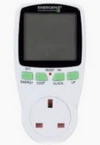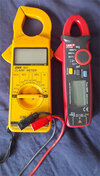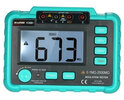I think their rules are good, we also say, although not in any rule book, background leakage should not exceed 30%, where I think we fail, is we don't ask the inspector to record the background leakage. We have to write down the insulation resistance, it seems, so we can see when an installation is degrading, but that will only work if the inspector is given previous test results, but we have never recorded background leakage, if we did then we could see at a glance if due to some degrading or simply due to capacitive and inductive linking.
As to more than one RCD, there are clearly problems with that, a caravan/boat supply will likely have two RCD's in series, not parallel, however with true caravans and boats we also have a 12 or 24 volt supply as well, it is the "mobile home" which causes the problem, and with this case, the way the supply is split.
Clearly pre-2008 install, so we only needed to have sockets likely to be used outside back then protected, but even post 2008, there are no rules to say anything like each floor socket outlets should be protected by two or more RCD's, and they should be arranged, so failure of a socket RCD should not result in loss of light, or any other installation design feature which would reduce the danger should an RCD trip. And I can't see how one could, my flat only have one socket circuit, which is enough, the house is spilt side to side, so should a socket supply fail I can use an extension lead to get a supply without it running up/downstairs, but there are no rules to say do this, just common sense.
I have in the last week abandoned the idea of putting the central heating supply on RCD protection, in the interests of personal safety, yes decided safer not to have RCD protection, than to have in the winter months to descend to my flat to reset any RCD down external steps in snow or ice, the risk of a fall due to snow or ice is far higher than the risk of a shock due to an earth fault.
I did some years back have an extension lead with a section of outer insulation removed so I could used my clamp meter to see what items used, it has since been replaced with one of these

in fact also have two which connect to internet as well, however having an extension lead were one can get the clamp around line and neutral (the lives) without the earth, would seem a good idea to test leakage of items like the dishwasher, and washing machine.
But still back to same question, what can
@heliarch do to aleave the situation? I think the meter I got at £35 is about the cheapest to read in 1 mA incruments. I got the
as both 1 mA incruments and DC, maybe there is a cheaper AC only option, but price does seem to have gone up. My orignal meter

on the left only measured in 10 mA incruments, and that does seem to be the norm. It still works and measures frequancy so did not get the version of meter to right which could do that. But the other option was the same price

and one needs to ask is it even worth measuring? He has a problem, showing what the problem is, does not cure it.




 in fact also have two which connect to internet as well, however having an extension lead were one can get the clamp around line and neutral (the lives) without the earth, would seem a good idea to test leakage of items like the dishwasher, and washing machine.
in fact also have two which connect to internet as well, however having an extension lead were one can get the clamp around line and neutral (the lives) without the earth, would seem a good idea to test leakage of items like the dishwasher, and washing machine. on the left only measured in 10 mA incruments, and that does seem to be the norm. It still works and measures frequancy so did not get the version of meter to right which could do that. But the other option was the same price
on the left only measured in 10 mA incruments, and that does seem to be the norm. It still works and measures frequancy so did not get the version of meter to right which could do that. But the other option was the same price  and one needs to ask is it even worth measuring? He has a problem, showing what the problem is, does not cure it.
and one needs to ask is it even worth measuring? He has a problem, showing what the problem is, does not cure it.
